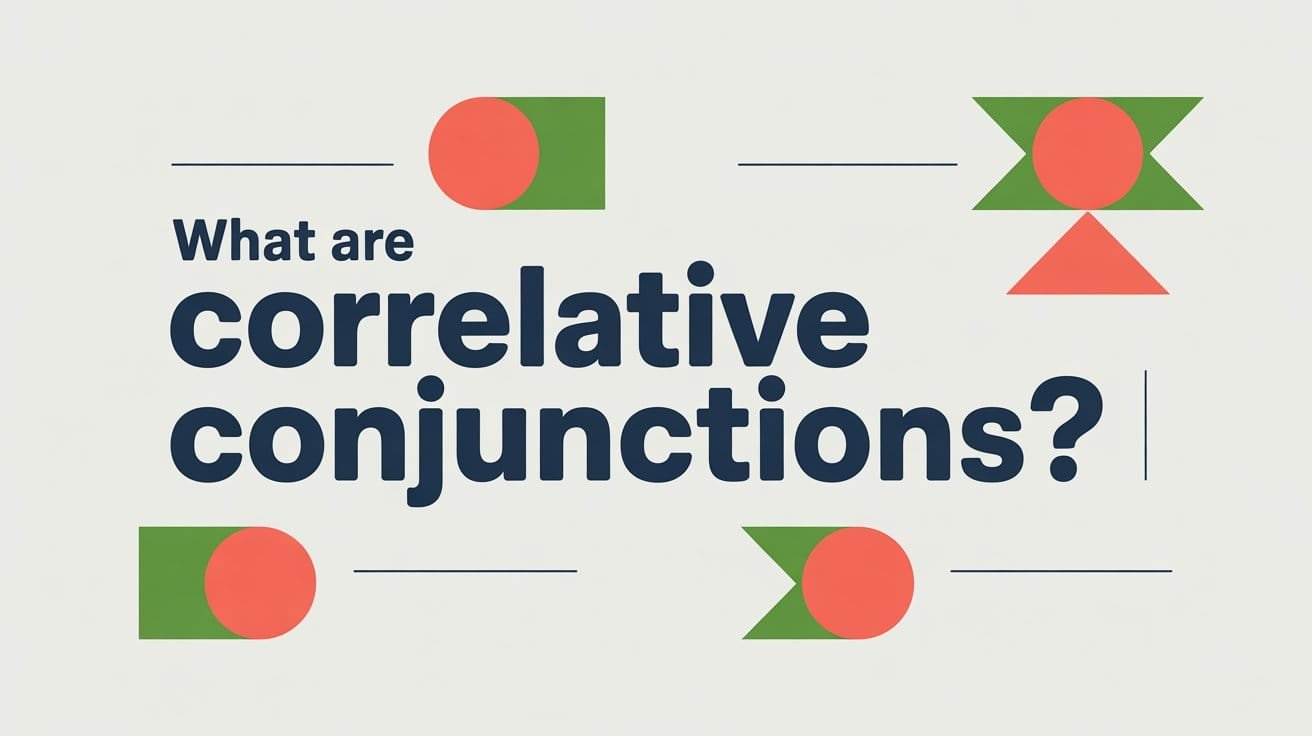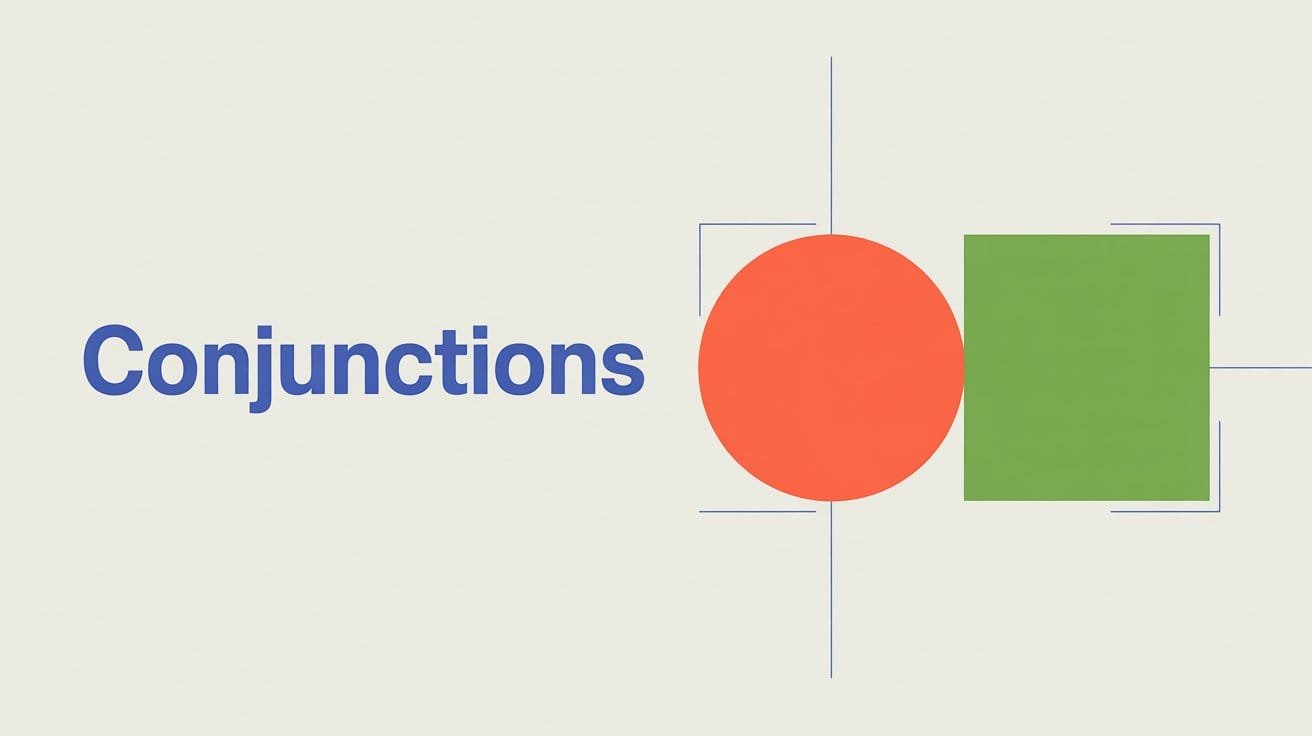Some conjunctions don’t work alone. They come in pairs to create balance and rhythm in a sentence. These are called correlative conjunctions. They connect two equal ideas and show how one relates to the other, often emphasizing contrast, choice, or combination.
Examples:
- You can either stay quiet or share your opinion.
- He’s not only polite but also confident.
Each pair works together like bookends, keeping the sentence structure even on both sides. Correlative conjunctions always appear in matching pairs to express a stronger relationship.
What are Correlative Conjunctions?
Correlative conjunctions are pairs of words used to connect similar elements within a sentence. They work in pairs to link words, phrases, or clauses that carry equal weight or importance in a sentence. They always appear in matching sets like both…and, either…or, or not only…but also.
Examples:
- She is both a teacher and a writer.
- You can either call now or send a message later.
- He was not only tired but also hungry.
Each pair shows a relationship between the two connected ideas, whether it’s addition, choice, contrast, or emphasis.
How They Work
Correlative conjunctions ensure grammatical balance. The two parts they connect must match in structure (noun with noun, phrase with phrase, or clause with clause). This concept is called parallelism, and it keeps writing smooth and clear.
Example:
Incorrect: The policy applies not only to students but also staff members. (uneven structure)
Correct: The policy applies not only to students but also to staff members.
Correlative conjunctions make writing more expressive. These pairs work in harmony to create cohesive, impactful sentences by maintaining a balance among the different parts of speech.
Correlative Conjunction List
The table below lists the most common correlative conjunction pairs in English, along with their main function.
| Conjunction Pair | Function / Use |
|---|---|
| both … and | Adds or combines two related ideas |
| either … or | Offers a choice between two options |
| neither … nor | Expresses two negative alternatives |
| not only … but also | Adds emphasis or contrast |
| whether … or | Shows alternatives or uncertainty |
| as … as | Compares equal qualities |
| such … that | Shows cause and effect or degree |
| hardly … when | Indicates a quick or immediate sequence of actions |
Common Correlative Conjunction Pairs Examples
Both … And
Used to add or combine two related ideas of equal weight. This pair shows that both qualities or items are true or relevant.
Examples:
- The project was praised for both its creativity and its practicality.
- Dr. Evans is respected for both her research and her mentoring skills.
Either … Or
Used to express a choice or alternative between two possibilities. It signals that only one of the two options applies.
Examples:
- You can either renew the lease now or look for a larger office.
- Either the printer is out of ink, or the cable isn’t connected properly.
Neither … Nor
Used to join two negative ideas or options, meaning “not one and not the other.”
Examples:
- The committee approved neither proposal nor the revised budget.
- Neither the mayor nor the council members attended the press briefing.
Not Only … But Also
Adds emphasis, showing that both ideas are true; often used for contrast or to highlight something unexpected.
Examples:
- The policy is not only effective but also environmentally responsible.
- He’s not only fluent in Spanish but also trained as a translator for legal documents.
Whether … Or
Used to show uncertainty, alternatives, or options when the outcome is unknown. It helps express situations where both possibilities are being considered.
Examples:
- She couldn’t decide whether to accept the overseas position or stay with her current team.
- The report will be released whether the results are favorable or not.
As … As
Used to compare two equal or similar qualities. It emphasizes equality between two ideas or features.
Examples:
- The conference was as informative as it was well-organized.
- This software is as reliable as the premium version, but half the cost.
Rules for Using Correlative Conjunctions
Correlative conjunctions can make writing sound refined and well-balanced, but only if they’re used correctly. The two words in the pair must work together in both meaning and structure. Here are the main rules to follow.
Keep the Structure Parallel
The words, phrases, or clauses joined by correlative conjunctions should follow the same grammatical pattern. Mixing forms breaks the rhythm and makes the sentence sound awkward.
Incorrect: The company aims to either reduce waste or efficiency will improve.
Correct: The company aims to either reduce waste or improve efficiency.
Use Correlative Conjunctions to Join Equal Ideas
Each side of the conjunction should connect similar types of ideas—either two nouns, two adjectives, two verbs, or two clauses.
Incorrect: He neither attended the meeting nor was interested in the proposal.
Correct: He neither attended the meeting nor showed interest in the proposal.
Avoid Redundant or Mixed Conjunctions
Each pair must work as a set. Do not mix different conjunctions or use unnecessary extras.
Incorrect: He was both talented as well as ambitious.
Correct: He was both talented and ambitious.
Use for Emphasis — But Not Too Often
Correlative conjunctions can make sentences more expressive, but overusing them can sound repetitive or overly formal.
- The proposal was not only detailed but also convincing. (effective use)
- The report was both informative and persuasive, not only clear but also thorough. (too many pairs in one sentence)
Examples of Correlative Conjunctions in Sentences
- The documentary was praised for both its emotional depth and its honest storytelling.
- The new policy benefits both employees and contractors working remotely.
- You can either submit your application online or drop it off at the main office.
- The speaker will either focus on leadership strategies or discuss time management techniques.
- The hotel offered neither breakfast nor room service during renovation.
- She showed neither surprise nor disappointment when the results were announced.
- The company is not only reducing carbon emissions but also investing in renewable energy.
- He’s not only fluent in French but also certified to teach it professionally.
- The board will make a decision whether the funding is approved or delayed.
- We’ll continue production whether the demand increases or declines.
- The new design is as practical as it is elegant.
- Her explanation was as thorough as the research itself.
- It was such a powerful performance that the audience stood in silence afterward.
- He spoke with such conviction that even critics applauded.
- She had hardly stepped inside when the alarm went off.
- They had hardly begun their journey when the rain started.
FAQs About Correlative Conjunctions
What are correlative conjunctions?
Correlative conjunctions are pairs of words that work together to join equal grammatical elements, like two nouns, adjectives, or clauses. Examples: both…and, either…or, and not only…but also
What is the difference between coordinating and correlative conjunctions?
A coordinating conjunction is a single word (and, but, or) that joins equal ideas.
A correlative conjunction comes in pairs (both…and, either…or) and adds a stronger connection or emphasis.
Do correlative conjunctions always appear together?
Yes. Both parts of the pair must appear for the sentence to be correct and balanced.
What is parallelism in correlative conjunctions?
Parallelism means using the same grammatical structure on both sides of the conjunction.
Example: He enjoys both swimming and running. This keeps the sentence balanced and easier to read.
How many correlative conjunction pairs are there?
There’s no fixed number, but English commonly uses around eight to ten standard pairs, such as both…and, neither…nor, not only…but also, whether…or, and such…that.



